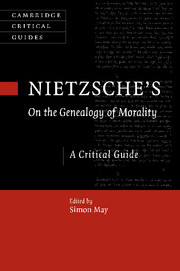Book contents
- Frontmatter
- Contents
- Contributors
- Acknowledgements
- Note on texts, translations, and references
- Introduction
- Chapter 1 The future of evil
- Chapter 2 On the nobility of Nietzsche’s priests
- Chapter 3 The genealogy of guilt
- Chapter 4 Why Nietzsche is still in the morality game
- Chapter 5 Who is the “sovereign individual”? Nietzsche on freedom
- Chapter 6 Ressentiment and morality
- Chapter 7 The role of life in the Genealogy
- Chapter 8 The relevance of history for moral philosophy
- Chapter 9 Why would master morality surrender its power?
- Chapter 10 “Genealogy” and the Genealogy
- Chapter 11 The promising animal
- Chapter 12 Nietzsche and the “aesthetics of character”
- Chapter 13 Nietzsche and the virtues of mature egoism
- Chapter 14 Une promesse de bonheur? Beauty in the Genealogy
- Bibliography
- Index
Chapter 7 - The role of life in the Genealogy
Published online by Cambridge University Press: 05 November 2011
- Frontmatter
- Contents
- Contributors
- Acknowledgements
- Note on texts, translations, and references
- Introduction
- Chapter 1 The future of evil
- Chapter 2 On the nobility of Nietzsche’s priests
- Chapter 3 The genealogy of guilt
- Chapter 4 Why Nietzsche is still in the morality game
- Chapter 5 Who is the “sovereign individual”? Nietzsche on freedom
- Chapter 6 Ressentiment and morality
- Chapter 7 The role of life in the Genealogy
- Chapter 8 The relevance of history for moral philosophy
- Chapter 9 Why would master morality surrender its power?
- Chapter 10 “Genealogy” and the Genealogy
- Chapter 11 The promising animal
- Chapter 12 Nietzsche and the “aesthetics of character”
- Chapter 13 Nietzsche and the virtues of mature egoism
- Chapter 14 Une promesse de bonheur? Beauty in the Genealogy
- Bibliography
- Index
Summary
Introduction
Nietzsche is quite clear that at least one central purpose of On the Genealogy of Morality is to help us assess the value of the values, the value judgments, of morality:
[U]nder what conditions did man invent the value judgments good and evil? and what value do they themselves have? Have they up to now obstructed or promoted human flourishing [Gedeihen]? Are they a sign of distress, poverty and the degeneration of life? Or, on the contrary, do they reveal the fullness, strength and will of life, its courage, its confidence, its future?
(GM, Preface, 3)Later in the same preface he writes:
[W]e need a critique of moral values, the value of these values should itself, for once, be examined . . . People have taken the value of these “values” as given, as factual, as beyond all questioning; up till now, nobody has had the remotest doubt or hesitation in placing higher value on the “good man” than on “the evil,” higher value in the sense of advancement, benefit and prosperity [Gedeihlichkeit] for man in general (and this includes man’s future). What if the opposite were true? . . . So that morality itself were to blame if man, as species, [des Typus Mensch] never reached his highest potential power and splendour?
(GM, Preface, 6)One kind of assessment being made is relatively clear. We are to assess the values of morality instrumentally: do they promote human flourishing? What is less clear is precisely what is meant by human flourishing. Obviously it has something to do with power and splendor but without further elaboration one would worry that the circle of concepts might be too tight for comfort. Flourishing also seems to be connected to something called “life” where life is being conceived of as something that can be stronger or weaker, degenerating or growing, confident or in distress. Consider the focus in GM, Preface, 3, on the values of morality as symptoms of the condition of life. Again, it is not obvious what to make of this.
But perhaps the most fundamental puzzle is that these apparent values of flourishing, power, or splendor are themselves never critiqued or questioned. Why would precisely the genealogy of these very values not be an obvious, and crucial, task to take up? It is not as though Nietzsche promises to carry out this task elsewhere, and it does not look as though any such critique or genealogy is carried out in GM itself. How could someone with Nietzsche’s endless suspicions, with his fine sense for psychological blind spots, with his intense self-reflective curiosity, not have taken up precisely the question of where these values come from, what their origin is? After all we are talking of someone who wrote:
Every philosophy is a foreground philosophy – that is a hermit’s judgment: “There is something arbitrary in his stopping here to look back and look around, in his not digging deeper here but laying his spade aside; there is also something suspicious about it.”
(BGE, 289)Indeed, the very phrase, repeated in various forms by Nietzsche, “the value of these ‘values’,” cries out for the repeated application of the question.
- Type
- Chapter
- Information
- Nietzsche's On the Genealogy of MoralityA Critical Guide, pp. 142 - 169Publisher: Cambridge University PressPrint publication year: 2011
- 11
- Cited by

